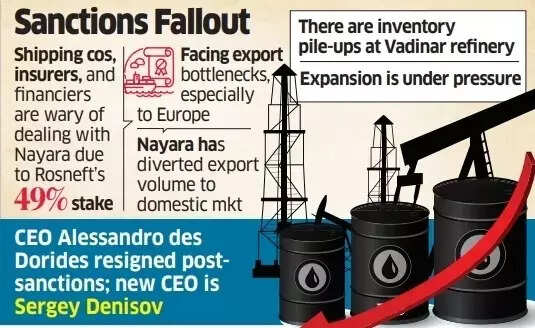Nayara Energy, the Russia-backed Indian refinery, is facing a perfect storm – hit by European Union sanctions, currently faces multiple challenges: disrupted global shipping, domestic regulatory constraints, changes in leadership and concerns regarding digital infrastructure.Nayara Energy, responsible for approximately 8% of India’s refining capacity and 7% of its retail fuel station network, these difficulties are testing both the company’s adaptability and its future planning.Nayara Energy operates India’s second-largest private refinery, alongside its oil storage terminal, port facilities, infrastructure and a network exceeding 6,000 petrol stations, according to an ET report.Its ambitious growth trajectory now faces significant uncertainty.
EU sanctions impact on Nayara Energy
On July 18, the EU implemented its 18th sanctions package against Russia, with restrictions on fuel imports refined from Russian crude, reducing the Russian oil price cap to $47.6 per barrel from $60 and addressing the shadow fleet involved in transportation. The price cap becomes effective September 3. Additionally, US President Donald Trump has imposed 50% duties on Indian imports, alleging India’s support for Moscow’s Ukrainian campaign through oil purchases.Also Read | Donald Trump tariffs: How much will India’s fuel bill rise if it stops Russian crude oil imports & where would it buy from? ExplainedDespite avoiding direct sanctions, Nayara’s substantial Russian ownership has resulted in progressive complications.Shortly after the latest EU sanctions were implemented, Alessandro Des Dorides stepped down as Nayara Energy’s chief executive, with Sergey Denisov, a company veteran since 2017, taking the helm.On July 28, Nayara Energy faced a significant challenge when Microsoft blocked their access to data, tools and products, despite having valid paid licences. Although services were restored following legal action by Nayara, the incident highlighted the gravity of their situation.A trader with knowledge of the situation was quoted as saying, “Nayara’s troubles have just begun. It is not only barred from exporting refined products to Europe, but fearing penalties, shipping companies are pulling back from transporting its products. Insurers and trade finance providers are wary.” The source indicated this has limited the company’s ability to service export markets in Europe, Southeast Asia and parts of Africa.According to Care Ratings’ July assessment, exports represented 25-30% of Nayara’s total revenue, with domestic Indian sales accounting for the remainder. Despite minimal direct EU exports, with most international sales occurring through traders serving various markets, Nayara is actively seeking alternative payment arrangements as EU sanctions loom. Reports suggest the company is looking to partner with a local bank to handle crude oil import payments and receive funds for refined fuel exports.

Sanctions fallout
Under the weight of sanctions, Rosneft has been unable to transfer profits from Nayara Energy in recent years. According to informed sources, this inability to move earnings from the company is considered a primary factor in its consideration to divest the Indian operation.The recent wave of sanctions has created additional obstacles to this process. Discussions have occurred with Indian business groups, with valuations exceeding $20 billion.In a parallel development, UCP Investment Group, a prominent Russian financial investment organisation, seeks to dispose of its Nayara Energy holding for more than $5 billion. This follows Trafigura’s divestment of its 24.5% ownership to Hara Capital Sarl, a fully-owned subsidiary of Italian energy investment company Mareterra Group Holding, in January 2023. Industry experts suggest that sanctions could reduce Nayara’s market value, potentially making it an appealing prospect for international investors.
History of Nayara Energy
In August 2017, following the acquisition of Essar Oil’s 20-mtpa Vadinar refinery (Gujarat) by a Rosneft-led consortium, the entity was rebranded as Nayara Energy. The name combines ‘Naya’ (Hindi for new) and ‘Era’, reflecting the shareholders’ aspirations for the asset’s future development.The establishment of Nayara coincided with significant reforms in India’s petroleum sector, where the government’s deregulation of fuel retail prices created equal opportunities for private retailers like Nayara to expand their network, according to the ET report.This liberalisation caused considerable anxiety among state-operated oil marketing companies, which had previously maintained a stronghold over fuel retailing. Their primary concern was the potential loss of market share to private entities such as Nayara and Reliance Industries, the report said.Also Read | India-US trade deal: With Donald Trump’s 50% tariffs looming, India reviews market access offers for US; three-pronged strategy to protect exportersNayara has seen steady growth until it encountered difficulties from sanctions imposed by the United States and EU, aimed at targeting Russia following its Ukraine war. The company’s oil and energy revenue has become particularly vulnerable.The acquisition of the Essar facility by Russia’s state energy corporation and an international investor consortium comprising Trafigura and UCP Investment Group was valued at $12.9 billion. This represented Rosneft’s most substantial overseas investment in India’s refining industry, securing access to one of the world’s rapidly expanding markets.
Nayara Energy’s focus on domestic market
Nayara Energy has been compelled to focus on domestic markets due to international constraints. Recently, the company approached government-owned refineries, proposing to sell them its export-designated petrol and diesel quantities to avoid stockpiling.The shift towards domestic sales provides temporary respite but affects profitability. European markets traditionally yielded higher returns compared to domestic sales. Competition within India, particularly from government-owned fuel retailers, restricts pricing autonomy and adaptability.Also Read | Explainer: Donald Trump’s 50% tariffs – will India budge on Russia crude oil trade?This situation emerged precisely when Nayara Energy was preparing for substantial expansion. The company had declared intentions to invest more than ₹70,000 crore in various sectors including petrochemicals, ethanol production facilities and retail infrastructure development. Since August 2017, it had already invested over ₹14,000 crore in Indian projects, encompassing refinery upgrades, a petrochemical facility and infrastructure developments.The sanctions now threaten to disrupt technical assistance from European technology providers, essential for refinery operations. The critical consideration remains whether Nayara can maintain its diversification strategy while its primary refining-export operations face challenges under western restrictions.




